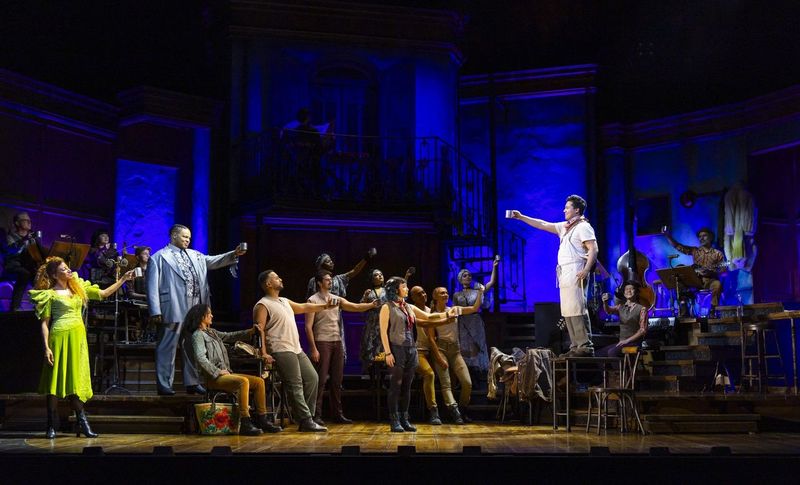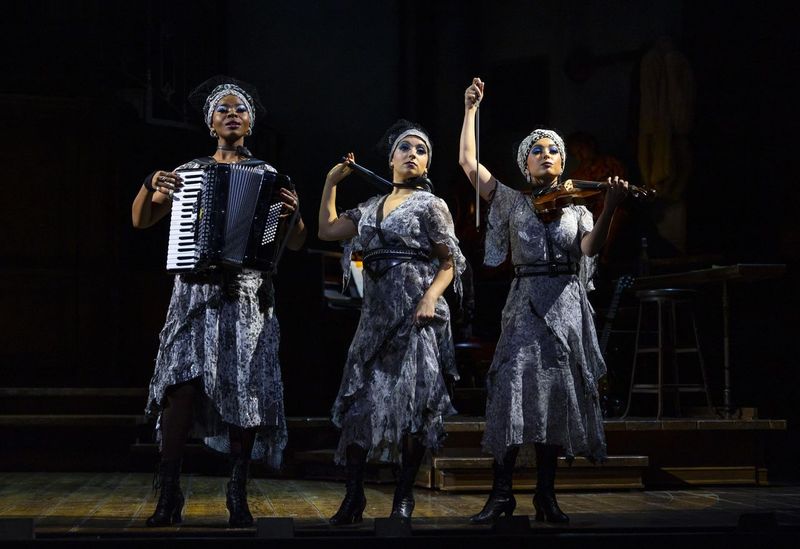
Hadestown North American Tour. Photo by T Charles Erickson.
Presented by the Boch Center
Developed With/Directed by Rachel Chavkin
Music and lyrics by Anaïs Mitchell
Featuring Amaya Braganza, Lana Gordon, Will Mann, J. Antonio Rodriguez, Marla Louissant, Lizzie Markson, Hannah Schreer, Sevon Askew, Jamal Lee Harris, Cate Hayman, Quiana Onrae’l Holmes, and Daniel Tracht
Music Supervisor and Vocal Arrangements by Liam Robinson
Choreography by David Neumann
Lighting by Bradley King
Scenic Design by Rachel Hauck
April 23-28, 2024
Boch Center, Wang Theatre
270 Tremont St.
Boston, MA 02116
HADESTOWN runs approximately 2 hours and 30 minutes, including a 20-minute intermission.
Review by Craig Idlebrook
BOSTON, Mass. — It can be said that mainstream American storytelling often takes its tone from modern Christianity, centering stories on a struggle between good and evil. Through this individualistic lens, if our hero is good enough and smart enough, they can decide their fate and overcome all challenges.
The ancient Greeks? They were not so optimistic about the chances of the individual in their stories. In Greek mythology, there are a bewildering number of gods, and they are just as likely to mess with humans as they are with each other. Mere mortals often get caught in the crossfire of inter-god rivalries, and there is little they can do to escape their fates, as The Fates have almost all the action on pre-determined lockdown.
This is the backdrop for Hadestown, the popular musical currently touring New England. It re-tells the tragedy of Eurydice (Amaya Braganza) and Orpheus (J. Antonio Rodriguez), a pair of lovers who almost go to hell and back to try and find their happily ever after. Orpheus has some godly parentage and is working on a song to sing-oh when Eurydice blows into his life without two coins to put over her eyes. He is immediately smitten with her and soon wins her over.
Unfortunately the lovers, and indeed the entire world, get caught up in a lover’s spat between Persephone (Lana Gordon) and Hades (Sevon Askew). These two have a complicated marriage, as Hades stole Persephone to live in the underworld, and then, when she is to be set free, tricks her into eating six seeds to lock her into returning six months out of the year. When Persephone is gone, her mom, Demeter, mourns. The world cries with Demeter, as she is a goddess of the harvest.
Things do not go well for our hero/lovers, despite Orpheus’s bravery and uniqueness. This is not a Hollywood rom-com; it’s a Greek tragedy.
Tragedies are an acquired taste, and Greek tragedies, even more so, and here I must confess my bias. While I have no problem watching Romeo and Juliet make the same mistakes on stage over and over again, I sometimes have trouble with the bleakness of Greek tragedies. I often don’t connect with the struggle of the heroes in Greek stories, as they can appear to be little more than meat puppets for a predetermined fate. I am sure this bias hindered me from fully investing in this show.
There were some other struggles on stage, as well. For example, there are competing points of view vying for our attention, and while each is crisply done in its own right, the shifting focus can cause consternation. Much of the action takes place in a bar/train station that feels reminiscent of the limbo vibe of the bar in Casablanca, and I fully began to buy into the sparking romance of the two young lovers under the watchful eyes of Hermes (Will Mann), who acts as the show’s MC.
Then we shift to a compelling vision of the underworld, and the driving force is Hades’ desperate quest to find meaning in the midst of middle age and a failing marriage. Here, we also get the vibe that Hades’ underworld is a stand-in for the emptiness of capitalism. Every aspect of the story is, more or less, compelling, but it’s hard at times to tell where the heart of the play is. Perhaps this is because everyone on stage, from the gods to the mortals, is also trying to figure out what life is all about.

The Fates, “Hadestown” North American Tour. Photo by T Charles Erickson.
Fortunately, it is easy to stay interested in this production. This is partly because of imaginative music and choreography, which draws heavily and is deeply indebted to musical and dance traditions and themes of Black Americans of the early 20th century. The lighting and set design also do a masterful job of world-building, evoking the weak and flickering light of fading hope and the confusion of the characters.
While the sound quality of this particular show too often lacked sonic clarity, there were some needle-drop musical numbers that fully drew in the audience. Seared into my mind is the Act I-ending tune “Why We Build the Wall”, a traditional call-and-response number that is expertly corrupted into a rallying cry of the “haves” versus the “have nots” at a political rally.
Askew is perfect in his delivery and creates the illusion of Hades as an all-powerful leader who lacks doubt, setting us up for his all-too-human self-doubt in the second act. The musical moments of the Fates also are compelling as singers Marla Louissaint, Lizzie Markson, and Hannah Schreer fuse harmonies and precise choreography to create an eerie and inescapable version of the Andrew Sisters.
Ultimately, this show is compelling in its vision of our mortal struggle to escape our ultimate fate, even if the action and music isn’t always as clear as I would have liked on stage.
